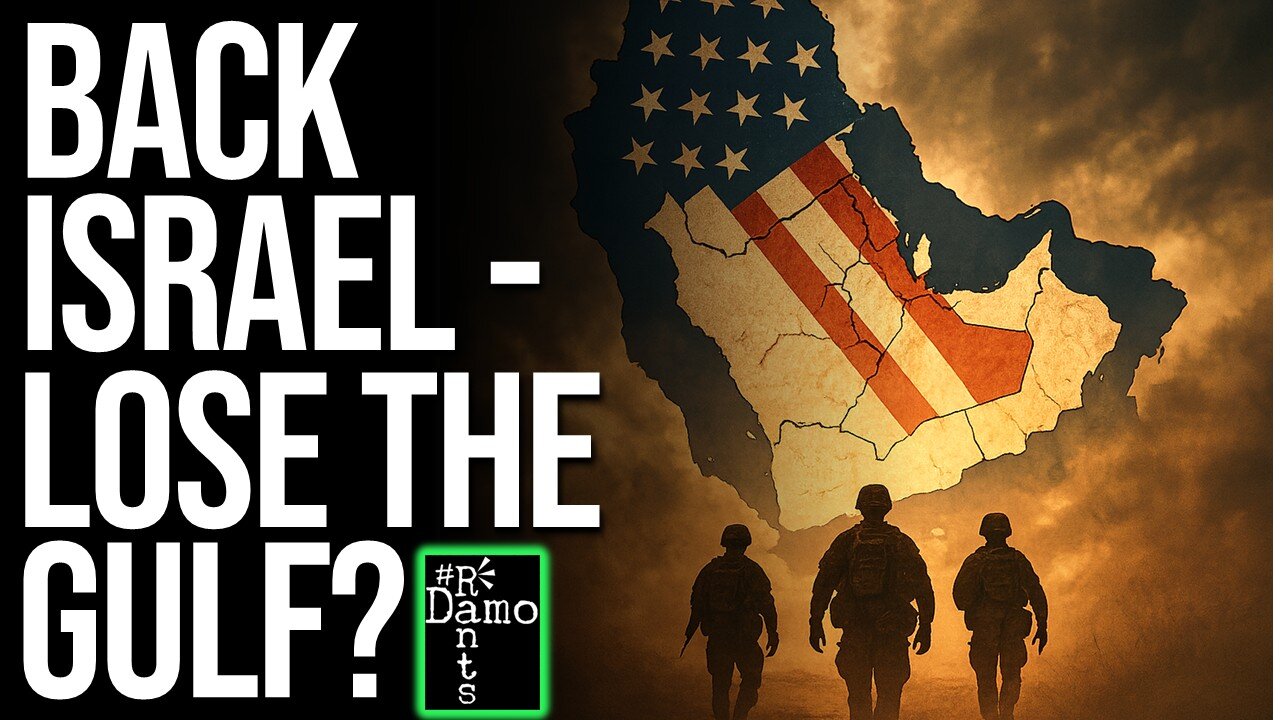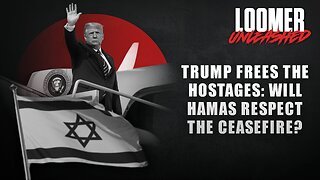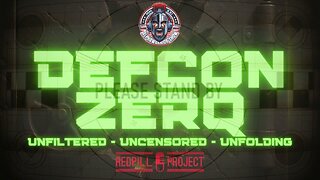Premium Only Content

US Backed Israel Again — And it Could Cost Them 10,000 Soldiers
Right, so, so much for Qatar’s American security umbrella. On 9 September, as we know, Israeli missiles tore into Doha while ten thousand US troops sat idly nearby at Al-Udeid Air Base, proving in a single night what the Houthis have been shouting about and warning of for years: Washington’s bases are there to defend Israel, not the Arabs who host them. Qatar’s capital was bombed under the shadow of CENTCOM’s headquarters in the Middle East, Al-Udeid being the largest US airbase in the region and the best Donald Trump could do was beg Netanyahu not to do it again. Netanyahu’s reply of course was one of open deranged defiance, followed by threats of more strikes, in Qatar and promises to get Hamas next time, all as if US red lines are drawn in disappearing ink. For Qatar, it was more than a humiliation. It was the collapse of the very bargain on which its security has rested for decades, that US promise in exchange for housing a massive airbase. Al-Udeid, was once Qatar’s shield, now it looks more like a shackle. So is Doha about to smash it and send Trump the message he deserves after this?
Right, so on 9 September, Israel did something that may well alter the strategic landscape of the Gulf and not in their favour. Its air force struck the capital of Qatar, Doha, in an operation that killed senior Hamas officials and left a Qatari security officer dead, though failed to assassinate the leaders it wanted to. The attack was extraordinary not simply because of its brutality, but because of where it took place. Doha is not Gaza or Damascus. It is a wealthy Gulf capital, home to the most significant American military presence in the Middle East: Al-Udeid Air Base, where ten thousand American personnel and the forward headquarters of United States Central Command are stationed. For decades, that base has been presented as both symbol and substance of Washington’s guarantee that Qatar and other Gulf monarchies are secure under the American umbrella. Yet on that September day, Israeli missiles fell on Doha and the umbrella did not open for them. What were all those US personnel doing? Twiddling their thumbs?
Israel’s justification only deepened the insult. Netanyahu and his ministers cloaked the strike in the language of “retaliation” and “security,” as if bombing a US ally’s capital and such a strategically important US site was a routine counter-terrorism measure. Israel Katz, Israel’s demented defence minister, declared that Israel would strike “wherever its enemies are,” reducing Arab sovereignty to a scrap of paper. This sickening excuse then became part of the scandal: Israel claimed the right to bomb Doha in order to feel safe in Tel Aviv. What could be more absurd?
Qatar’s leaders obviously reacted with fury. Publicly, they denounced the strike as state terrorism and a violation of their sovereignty, but sorry guys, you’re Arab, you’re second best to Israel and always will be. Privately, Prime Minister Mohammad bin Abdul Rahman Al Thani told United States officials that he regarded the attack as a betrayal by both Israel and Washington. The betrayal was only compounded by what has happened afterwards. The big orange bloater passing himself off as President, Donald Trump, who remains in the White House, apparently telephoned Benjamin Netanyahu twice to demand that Israel promise not to repeat such an action. Netanyahu not only refused to retreat but allowed his ministers to declare that Israel would strike “wherever its enemies are,” including Doha again if necessary. So for Qatar, the lesson should be humiliatingly clear. Hosting the largest American base in the region does not shield it from Israeli aggression. Israel always comes first for the US. Your sovereignty means nothing.
The strike has therefore turned Al-Udeid from a supposed guarantee of security into a potential bargaining chip. Qatar, for the first time in decades, is now apparently openly considering whether to re-evaluate its security partnership with Washington. The possibility of shutting Al-Udeid, or at least threatening to do so, gives Doha unprecedented leverage. But will they go that far? Can they go that far? Do they have other options?
The strike on Doha was not a random act of violence. It came at a moment when Hamas officials were meeting in Qatar to review a ceasefire plan that had been circulated by Donald Trump. For decades, Israel has flouted conventions of diplomacy by assassinating Palestinian and Arab leaders abroad, but there had been at least an informal understanding that neutral grounds of mediation would be respected. Doha was precisely such a space, not only because it hosted Hamas leaders but because it was a partner of Washington in brokering negotiations, in this case, Trump’s own ceasefire proposal. By targeting Hamas in Doha, Israel deliberately sabotaged diplomacy and humiliated its ally.
Qatari officials described the strike as “state terrorism,” language rarely used by a Gulf monarchy, but what other language is there? Al Thani told American envoys that he considered it a betrayal not only by Israel but by the United States itself. And his reasoning was very clear: Israel pulled the trigger, but Washington had failed to prevent it, had notified Qatar only at the last minute, and then offered no meaningful consequences for the violator.
Even more humiliating was the aftermath. Trump’s phone calls to Netanyahu revealed a President enraged but actually powerless. In the first call, Trump reportedly told Netanyahu that the strike was unacceptable and must not be repeated. Yet the following day, Israeli leaders spoke publicly of striking again if Hamas remained in Qatar. Defence Minister Katz promised to attack “wherever the enemy is,” effectively declaring that no Arab capital is off-limits. Israeli leaks gloated, “We’ll get them next time,” as if daring Qatar to expect further violation.
Israel bombed a US ally under the shadow of America’s own largest airbase, and Washington could do nothing but watch. To Arabs across the region, the message should now be obvious: Israel is untouchable, and American red lines are meaningless. For Doha, this has to be an existential insult now. Its capital had been bombed, one of its officials killed, its diplomacy sabotaged, and its sovereignty mocked. And the United States, despite having the most formidable military presence in Qatar itself, had done nothing to stop it and could not even compel Israel to desist from threatening more.
The key to understanding why this event resonates so deeply lies in the role of Al-Udeid Air Base. Established in the 1990s and dramatically expanded after 2001, Al-Udeid is the largest American base in the Middle East. It hosts around ten thousand American troops, strategic bombers, reconnaissance aircraft, drones, and the forward command of Central Command. It was designed to be not only a launch pad for American wars in Afghanistan, Iraq, and Syria, but also a physical guarantee that Qatar itself would be protected. The logic was simple: no state would dare attack a country hosting such an installation, for fear of provoking Washington. Qatar’s safety ought to have been iron-clad.
Yet September 9th proved otherwise. Israel struck Doha while Al-Udeid hummed in the background. American radar systems tracked the attack, but there was no interception. According to reporting, US officials did not warn Qatar until it was too late to act, a fact that Doha views as at best negligence and at worst complicity. In the aftermath, US officials condemned the strike as “counterproductive” and joined a United Nations Security Council resolution criticising Israel’s violation of sovereignty. Yet from Doha’s perspective, the symbolism was irreversible. The supposed shield of Al-Udeid had not only failed to stop an attack; it had crumbled into a liability, because Israel always get their way.
To continue hosting Al-Udeid under these conditions is to signal that Qatar accepts subordination therefore. It accepts that an American base on its soil is not a guarantee of sovereignty but a mark of dependency instead — and that dependency is one-sided, protecting Israel above all, even above the state where that base is situated. This is why Al Thani’s description of the incident as a betrayal resonated so widely. It is not simply that an ally failed. It is that the very structure of the alliance has been inverted. Al-Udeid was built as a shield. Now it stands as a shackle.
Yet if Al-Udeid is a shackle, it is also a potential weapon. Precisely because the base is so crucial to American operations, the possibility of closure or restriction gives Doha unprecedented leverage.
For the United States, the consequences of losing Al-Udeid would be dramatic. With forces withdrawing from Iraq already, Al-Udeid serves as the central hub for regional air campaigns and command. Without it, Washington would be forced to rely more heavily on smaller bases in Kuwait, Bahrain, and Jordan. Those facilities cannot replicate Al-Udeid’s scale or its command infrastructure. Relocating CENTCOM’s forward headquarters would be a logistical nightmare. Gulf observers are already questioning the reliability of the American umbrella now. If Qatar were to close Al-Udeid, that questioning would turn into a collapse of credibility. The image of American deterrence in the Gulf would be shattered.
For Israel, the stakes are equally high. Israeli freedom of action relies on the American grid of bases, refuelling capacity, and intelligence infrastructure in the Gulf, not that this seemingly occurred to the madmen who ordered this strike, or perhaps they just figured Gulf states would be ordered into line by the US. A hostile or closed Al-Udeid would mean not just the loss of logistics but the terrifying prospect of alternative powers gaining access instead. If China for example were invited in to fill the gap, Qatar having strong economic ties via its LNG supplies to China already, Israel would face the possibility of hostile monitoring of American–Israeli coordination. It would also lose the deterrent value of having American forces stationed on the soil of a Gulf ally that has long supported Palestinian causes rhetorically but tolerated American presence practically for security, but that security is now obviously uncertain, so perhaps China, or someone else would be a better security partner? Israel’s defence lies partly in Doha’s silence and acquiescence to the US. That silence has now been broken.
For Qatar itself, the leverage is both symbolic and material. Simply raising the possibility of closing Al-Udeid forces Washington to treat Doha’s concerns seriously. It restores agency to a state that had been humiliated. It demonstrates to Arab publics that Qatar is not simply a client but a sovereign actor prepared to use its assets strategically. It also gives Doha bargaining power. Even if it does not close the base outright, it can use the threat to demand stronger guarantees, more arms deals, or more visible pressure on Israel. It’s why some headlines are claiming that Qatar is saying its relationship with Washington is stronger than ever – their position actually is. In the new equation, Al-Udeid is no longer just America’s asset. It is Qatar’s card to play.
The credibility of Qatar’s leverage depends on whether it has plausible alternatives though. I mentioned China as a for instance a moment ago, because the truth is that it does, even if none are as comprehensive as American protection. But needs must right?
Turkey is the most immediate option. Although very pro West, Ankara has maintained a military base in Qatar since 2015 and expanded it during the Gulf blockade of 2017, when Saudi Arabia and the UAE attempted to isolate Doha. Turkish troops were a visible symbol of solidarity. Politically, President Recep Tayyip Erdoğan has positioned himself as a champion of Gaza and an opponent of Israeli aggression, though he does of course keep supplying Israel with oil. For Qatar, deepening Turkish deployments might provide an alternative protector that resonates with domestic and regional publics, but those well known pro Israel ties wouldn’t make it my pick still.
China is the long-term bet. Qatar is Beijing’s largest liquefied natural gas supplier, with a twenty-seven-year deal signed in 2022 — the longest and largest in history. While China has little military presence in the Gulf, its economic leverage and diplomatic role as broker of the 2023 Saudi–Iran rapprochement make it a credible alternative. Were Doha to invite limited Chinese security cooperation, it would send a powerful signal that the Gulf is no longer America’s exclusive playground and by selling out so heavily to Israel, who China are heavily critical of, they’ll have only brought that on themselves.
Iran is the neighbour that can never be ignored isn’t it? A deal with them would melt Trump’s spray tan clean off his face. Qatar and Iran share the massive South Pars/North Dome gas field though, the largest in the world, so they maintain diplomatic ties in mutual economic interest. Tehran would welcome even closer security ties with Doha as a blow to both Israel and Washington. Aligning too openly with Iran risks alienating other Arab neighbours, but this is becoming less a priority for many of them all things considered I would argue. So quietly deepening coordination with Iran could serve as deterrence against further Israeli strikes, particularly given the hobbling Iran gave Israel last time they struck Iranian territory.
But ultimately, as much fun as it is to speculate such scenarios, What this tells us is that Doha does not need to replace Washington outright. It only needs to demonstrate that it has other options in order to deal itself a better hand. That demonstration alone shifts the balance of power.
One of the most depressing features of the crisis was the silence of other Arab states though. Neither the United Arab Emirates nor Bahrain, both Abraham Accords signatories, condemned the strike. Saudi Arabia, which has flirted with normalisation, said nothing. Even Egypt, another mediator state and one that has previously been threatened with Israeli attack, remained quiet.
This silence is shameful. An Arab capital was bombed by Israel, yet Arab rulers prioritised their normalization deals and American patronage over solidarity with them, such is the problem with so many of these wealthy monarchical states, they are too insular and inward looking at their own interests. The result is a devastating blow to the idea of pan-Arabism or even basic Arab dignity. It confirms what many publics already believe: that their rulers will sell out Palestine and their own sovereignty to maintain US support and their own power.
It also vindicates the Houthis. For months, they have warned Gulf rulers that American bases do not protect Arabs but only serve Israel. They have claimed that US protection is a mirage and that only resistance movements genuinely confront Tel Aviv. Doha’s humiliation exonerates them completely, every single word they’ve said is true.
If Qatar simply maintains the status quo, the costs will be profound though. It loses credibility as a sovereign actor, appearing unable to prevent further Israeli strikes despite hosting the most powerful military in the world. It undermines its role as mediator in Gaza, since no resistance group will trust Doha to protect them after Hamas leaders were bombed under its watch. Domestically, it risks alienating a population that strongly supports Palestine and resents Israel’s impunity. Regionally, it allows rivals such as the UAE to present Qatar as weak and hypocritical, not that they can say much themselves.
Worst of all, it invites repetition. Netanyahu’s ministers have already threatened further strikes. Katz’s vow to strike enemies wherever they are, and Israeli leaks promising to “get them next time,” mean Doha must expect more. To continue hosting Al-Udeid under these threats is to invite humiliation twice over. To remain in the same position is not neutral. It is to accept that your shield is shattered, your protector is complicit, and your capital remains a target.
The temptation to hedge is therefore strong. Expanding Turkish deployments would provide immediate cover. Deepening economic ties with China and opening the door to symbolic security cooperation would signal a major shift. Quietly aligning with Iran on deterrence would raise the costs for Israel and the US.
Officially, Qatar continues to deny that it is reassessing its relationship with Washington. As I said a moment ago, state media and officials insist that the partnership is “stronger than ever.” But these denials look tactical. They are designed to reassure Washington in the short term while keeping options open in the medium term. Beneath the surface, Qatar is clearly recalibrating, because it cannot afford not to be.
The danger for Washington is not just Qatar. If Doha uses the Al-Udeid card, others may follow. Kuwait, Bahrain, and Jordan all host American forces. Each now faces the same realisation: their sovereignty is secondary to Israel’s impunity.
Losing Qatar would make these states more indispensable militarily but more vulnerable politically. Kuwait’s parliament is vocal and could turn anti-American. Bahrain’s Shi’a majority already resents the monarchy’s ties to Israel. Jordan’s streets are furiously pro-Palestinian. If Washington is seen as sacrificing Arab sovereignty for Israel, hosting bases becomes a political liability.
Saudi Arabia and the UAE tread more carefully. Neither condemned the strike, but neither celebrated it. They are watching closely. If Doha successfully leverages Al-Udeid to extract concessions or diversify partnerships, Riyadh and Abu Dhabi may demand the same.
Ultimately, the crisis forces a moral reckoning. What is the legitimacy of US bases in the Gulf if they cannot or worse will not protect their hosts? Al-Udeid was supposed to guarantee Qatar’s sovereignty. Instead, it has become the stage on which Israel humiliated it.
Doha must ask whether continuing this arrangement is compatible with its identity as a sovereign state and its image as a defender of Palestine. Arab publics are asking the same. The silence of the Abraham Accords states only deepens the shame.
The Houthis and Iran will argue that only resistance can defend sovereignty. Washington will argue that its presence is indispensable. Netanyahu will continue to threaten more strikes, ensuring the question cannot be avoided. And the world will ask: will Qatar dare to play the Al-Udeid card, or will it accept that its fate is bound forever to Israel’s impunity and surrender any notion of sovereignty as a result?
The Israeli strike on Doha has stripped away illusions. It has revealed that American protection is conditional, that Arab sovereignty is expendable, and that Israel acts with impunity even against the US ally hosting the largest American base in the region.
Qatar can either keep Al-Udeid and live under perpetual humiliation, or it can wield the threat of closure to reclaim sovereignty, force US concessions, and diversify its protectors. The silence of other Arab states makes Doha’s position more isolated but also more pivotal. If they play the Al-Udeid card, Qatar could transform itself from victim into leader and from client into actor and in an area with such intense state rivalries, other states could well follow suit for fear of losing face.
Al-Udeid was once Washington’s guarantee and they’ve destroyed that image. Now it is Qatar’s leverage. Whether Doha dares to use it or not will decide not only its own future but the balance of power in the Gulf and the credibility of the American presence in the Middle East. Shield Shattered. Base Betrayal. The question is no longer whether Qatar has leverage. The question is whether or not it will use it.
For more on the Doha talks going up literally in flames at Israel’s hands, check out this video recommendation here as your suggested next watch.
Please do also hit like, share and subscribe if you haven’t done so already so as to ensure you don’t miss out on all new daily content as well as spreading the word and helping to support the channel at the same time which is very much appreciated, holding power to account for ordinary working class people and I will hopefully catch you on the next vid. Cheers folks.
-
 2:35:27
2:35:27
FreshandFit
7 hours agoThe Biggest Debt Problem in America
93.4K14 -
 2:10:56
2:10:56
Inverted World Live
10 hours agoRobot Holocaust | Ep. 123
82.8K9 -
 3:22:33
3:22:33
Laura Loomer
10 hours agoEP149: Trump Frees the Hostages: Will HAMAS Respect the Ceasefire?
64.8K49 -
 1:02:02
1:02:02
The Nick DiPaolo Show Channel
10 hours agoTrump’s Success Rattling Lefties | The Nick Di Paolo Show #1804
39.1K28 -
 2:49:33
2:49:33
TimcastIRL
10 hours agoDemocrat Call On Liberals To 'FORCEFULLY RISE' Against Trump, DHS ATTACKED In Chicago | Timcast IRL
248K118 -
 2:50:07
2:50:07
Badlands Media
16 hours agoDEFCON ZERQ Ep. 013: Global Shifts, Spiritual Warfare, and the Return to Source
70.9K72 -
 6:21:11
6:21:11
SpartakusLIVE
11 hours agoLIVE from SUPER SECRET, VIP Location || BEACH FRONT into Verdansk
82.1K7 -
 1:20:01
1:20:01
Flyover Conservatives
1 day ago"The Testosterone Levels of a Baby Bird" - America’s Health Crisis w/ Dr. Troy Spurrill | FOC Show
56K3 -
 2:28:15
2:28:15
PandaSub2000
1 day agoSonic Racing CrossWorlds | ULTRA BESTIES & GAMES (Original Live Version)
35.3K1 -
 4:56:36
4:56:36
Drew Hernandez
13 hours agoDISGRACED SCOTUS REJECTS ALEX JONES' INFOWARS FREE SPEECH APPEAL
46.1K27